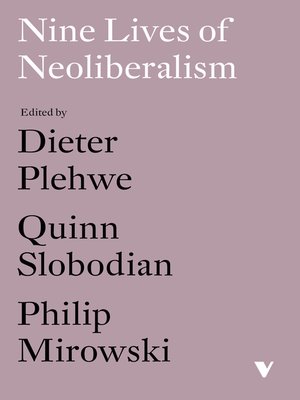
Sign up to save your library
With an OverDrive account, you can save your favorite libraries for at-a-glance information about availability. Find out more about OverDrive accounts.
Find this title in Libby, the library reading app by OverDrive.



Search for a digital library with this title
Title found at these libraries:
| Library Name | Distance |
|---|---|
| Loading... |
Untangling the long history of neoliberalism
Neoliberalism is dead. Again. Yet the philosophy of the free market and the strong state has an uncanny capacity to survive, and even thrive, in times of crisis. Understanding neoliberalism’s longevity and its latest permutation requires a more detailed understanding of its origins and development.
This volume breaks with the caricature of neoliberalism as a simple, unvariegated belief in market fundamentalism and homo economicus. It shows how neoliberal thinkers perceived institutions from the family to the university, disagreed over issues from intellectual property rights and human behavior to social complexity and monetary order, and sought to win consent for their project through the creation of new honors, disciples, and networks. Far from a monolith, neoliberal thought is fractured and, occasionally, even at war with itself. We can begin to make sense of neoliberalism’s nine lives only by understanding its own tangled and complex history.
Neoliberalism is dead. Again. Yet the philosophy of the free market and the strong state has an uncanny capacity to survive, and even thrive, in times of crisis. Understanding neoliberalism’s longevity and its latest permutation requires a more detailed understanding of its origins and development.
This volume breaks with the caricature of neoliberalism as a simple, unvariegated belief in market fundamentalism and homo economicus. It shows how neoliberal thinkers perceived institutions from the family to the university, disagreed over issues from intellectual property rights and human behavior to social complexity and monetary order, and sought to win consent for their project through the creation of new honors, disciples, and networks. Far from a monolith, neoliberal thought is fractured and, occasionally, even at war with itself. We can begin to make sense of neoliberalism’s nine lives only by understanding its own tangled and complex history.







